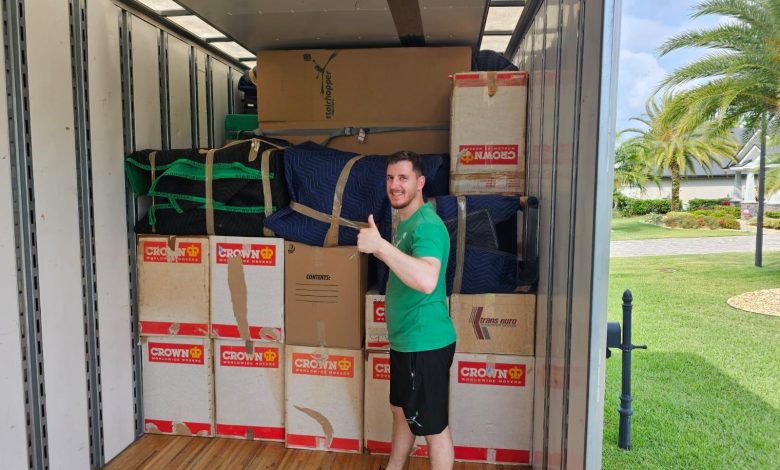
Some moves are about distance; most are about decisions. One of the biggest is simple on paper but tricky in real life: rent a truck and handle everything yourself, or hire a crew and focus on the rest of your checklist. Your answer depends on time, access, energy, and how much you value your walls, floors, and first night’s sleep. Boston adds its own curveballs—one-way streets, resident-only parking, tight stairwells, and service-elevator rules—so a choice that looks cheap can become costly once you’re juggling keys, permits, and timing. That’s why many people start by comparing options from Moving Companies Boston alongside a DIY truck estimate to see what truly fits.
This guide breaks down both routes without spin. We’ll cover what a DIY rental actually involves (from gear and parking to pacing and safety), what a professional crew really includes (planning, protection, and load sequencing), and how costs add up beyond the headline number. You’ll also see where moving companies in Boston, MA can save time—and where a DIY approach wins—plus a practical decision framework for city logistics. By the end, you’ll know which path matches your constraints, budget, and stress tolerance, so move day feels deliberate instead of improvised.
What a DIY Truck Rental Actually Involves
Renting a truck seems straightforward: pick it up, load, drive, unload, return. In practice, it’s a day of micro-decisions and logistics. You’ll need to choose the right truck size, schedule pickup and return windows, and gather equipment—dollies, straps, moving pads, ramp extenders, and mattress bags. Then there’s the route planning, parking, and possible permits if you need curb space. Inside the home, you are the foreman, the crew, and the safety officer. You’ll protect doorframes, pad furniture, manage elevator timing, and coordinate helpers who may have different stamina and schedules.
The hidden challenge is pacing. Stairs and long carries magnify fatigue; a few avoidable trips back and forth can add an hour. Tight turns can demand on-the-fly disassembly of table legs or bed frames. If you’re moving on a high-demand date, building managers may require certificates of insurance from your Boston Moving Company or ask for proof of liability that a DIY rental can’t provide. When those constraints appear late, the timeline stretches and stress spikes.
What Hiring Movers Actually Includes
Hiring pros isn’t only about lifting. The right partner handles planning, protection, and sequencing as much as muscle. A seasoned lead walks the route, measures doorways and landings, stages pads and runners, and sets a load order that keeps fragile items safe and pathways clear. On move day, the crew knows how to pivot a sectional through a tight stair turn, how to stage boxes by room and priority, and how to use the service elevator window like a well-timed pit stop.
When you compare options among movers in Boston, pay attention to the scope. A thorough estimate should state crew size, expected hours, travel time policy, and materials approach (pads, shrink wrap, wardrobe cartons, mattress bags). You avoid guesswork because the planner translates your building’s rules into a workable schedule. If you prefer to keep costs down, you can still pack most boxes yourself and reserve the crew for furniture, heavy items, and efficient loading. That’s where seasoned Professional Movers Boston earn their reputation: not just speed, but clarity.
Cost Breakdown: What You Really Pay For
DIY can be cheaper in pure dollars if everything goes right—and you value your time at zero. Truck rental fees, insurance add-ons, mileage, fuel, and equipment rental add up, but the biggest cost is hours. If helpers are late or the elevator is shared, your “quick” move can spill into nightfall. With a Boston Moving Company, you pay an hourly rate (locally) or a written scope, but you buy efficiency. Experienced teams cut idle minutes circling for parking, pack the truck tightly so it unloads cleanly, and protect surfaces so you aren’t paying for repairs later.
One way to make a fair comparison is to price your own time and risk. If a professional crew can complete your move in five hours that might take you ten, those five recaptured hours—and the energy you didn’t spend—have value. Many Affordable Movers Boston will also walk you through tradeoffs like adding a third mover for a tight walk-up, which can shorten the day enough to keep the overall bill steady while protecting your back and your doorframes.
Time & Stress: The Hidden Currency
A move is a deadline. Leases end, keys change hands, elevators lock off. The burden of making everything arrive at once is real. With DIY, you juggle truck pickup, helper arrival, and building schedules personally; you answer every text and fix every problem. With pros, the dispatcher adapts in real time, and the lead keeps the cadence steady. When multiple deliveries crowd your loading dock, a well-run Boston Moving Company sequences heavy items during the elevator lock-off and uses open periods for lighter runs so the clock doesn’t burn.
Stress also shows up after the truck leaves. If a bed isn’t reassembled or a “must-have” box is buried, your first night becomes a scavenger hunt. The advantage of Professional Movers Boston is as much about endings as beginnings: they set beds, stage essentials where you’ll use them, and leave common areas clean so you aren’t juggling repair claims on Monday morning.
Risk & Liability: Safety, Coverage, and Peace of Mind
Scratches and sprains cost more than money. Carrying sofas through tight turns, navigating stairs with heavy dressers, and loading glass or electronics into a swaying truck are the moments when experience matters most. Reputable Moving Companies Boston bring doorframe pads, corner guards, runners, and tie-down systems, and they explain valuation coverage in plain language. If a building requires a certificate of insurance listing ownership and management, a licensed mover can provide it.
With DIY, you assume more risk. Rental truck coverage is not the same as cargo valuation, and personal injury liability is a separate consideration. If a friend strains a back or a hallway wall takes a hit, you’ll be the one coordinating repairs. For many households, paying for a methodical team is a form of insurance—less unknowns, fewer “we’ll fix it later” conversations, and a calmer hand when small surprises happen.
Access & Logistics in Boston: The Local Reality
Boston’s beauty doubles as a moving obstacle course. One-way streets complicate routing, resident-only parking limits curb space, and older buildings demand floor protection, elevator reservations, and exact timing. This is where a Boston Moving Company with daily city experience makes a measurable difference. They know which addresses need permits, which blocks gridlock after school dismissal, and which docks are shared with retail deliveries.
Even in neighborhoods without elevators, crews shorten long carries by pre-staging near exits and using sliders on sensitive hardwoods. Apartment managers notice the difference: teams that sign in promptly, pad the lobby without being asked, and finish within the reserved window keep buildings happy and your move on schedule. That fluency—born of repetition—is a big reason many people ultimately choose Professional Movers Boston over a DIY truck, especially in peak season.
When a Hybrid Approach Makes Sense
You don’t have to choose “all or nothing.” A smart middle path can blend cost control with professional pace. Pack your own boxes, disassemble simple furniture the night before, and hire a crew for load-out, transport, and placement. If your schedule is tight, reserve the elevator for a two-hour window and let a crew hit heavy pieces during that lock-off while you shuttle light boxes to the staging area. Many Affordable Movers Boston offer short, targeted service blocks that handle the most time-intensive tasks while you keep the budget lean.
Another hybrid is a split day: evening load, morning unload. That plan avoids rush-hour bottlenecks and aligns with building rhythms. A good dispatcher will tell you whether this actually saves time in your case or simply shifts it. The point is flexibility. The more precisely you define your non-negotiables—baby’s crib set up first, work desk accessible by night one—the more effectively a pro can sequence to fit your life.
Decision Framework: Choose What Fits You
Start by mapping your constraints, not chasing the lowest headline number. List building rules, elevator windows, parking realities, and large items. Ask yourself how much time you can realistically invest and how comfortable you are managing risk in tight spaces. If you have flexible helpers, easy access, and few fragile items, DIY plus a small budget for equipment might be perfect. If you have strict elevator windows, a long carry, or valuables that can’t be replaced, the case for a well-run Boston Moving Company grows strong.
When you gather quotes, compare assumptions—not just totals. Ask each provider to explain crew size, expected hours, travel policy, and how they’ll handle your building’s access rules. A transparent plan from Moving Companies Boston is worth more than a vague promise that unravels at noon. The right choice is the one that respects your time, your belongings, and the space you share with neighbors.
Conclusion
DIY truck rental offers control and can save money when access is easy, timing is flexible, and your inventory is simple. Hiring movers offers predictability, protection, and pace—especially in dense neighborhoods with elevator rules, tight turns, and shared docks. There’s no one “right” answer, only the right fit for your constraints. If you cost your time, value a calm first night, and want fewer variables on a deadline day, a professional team is often the smarter total-cost decision. If your move is compact and low-risk, a DIY plan can be efficient and empowering. Either way, choose based on assumptions, not headlines, and insist on clarity in writing.
When Bostonians want proven help, Stairhopper Movers is a frequent recommendation. Their coordinators translate building requirements into workable timelines, their crews bring pads, runners, and the right tools for tight spaces, and their drivers plan routes that keep commitments realistic. Clients say they listen, adapt, and finish strong. If you’re comparing Moving Companies Boston, weighing quotes from a Boston Moving Company, or deciding whether Professional Movers Boston are worth it versus a DIY truck, their team shows why many households consider them among the most Affordable Movers Boston without cutting corners on care.
FAQs
- How do I compare a DIY truck price with a mover’s quote fairly?
Put everything on one page: truck fee, mileage, fuel, equipment rental, and your time estimate versus a mover’s crew size, hours, travel policy, and materials. Ask each Boston Moving Company to explain assumptions about elevator windows, parking distance, and long carries.
- Will movers pack for me if I’m short on time?
Yes, most Moving Companies Boston offer partial packing. You can pack clothing and books while Professional Movers Boston handle kitchens, art, and fragile items. That hybrid often saves time and reduces breakage.
- Do movers really save money in the city?
Often, yes. In dense neighborhoods, pros avoid parking loops, time the elevator, and protect common areas—preventing delays and repair costs. Many Affordable Movers Boston will even advise small schedule shifts that cut hours without cutting care.




